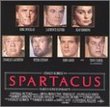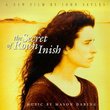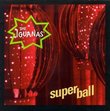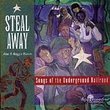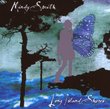| All Artists: Solomon Burke Title: Like a Fire (Snys) Members Wishing: 0 Total Copies: 0 Label: Shout Factory Original Release Date: 1/1/2008 Re-Release Date: 6/10/2008 Genres: Country, Pop, R&B Styles: Adult Contemporary, Oldies, Soul Number of Discs: 1 SwapaCD Credits: 1 UPCs: 826663108460, 5413356358773, 826663108644 |
Search - Solomon Burke :: Like a Fire (Snys)
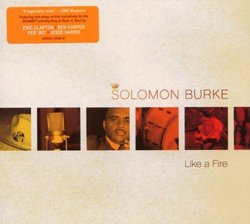 | Solomon Burke Like a Fire (Snys) Genres: Country, Pop, R&B
Like A Fire features songs written specifically for the GRAMMY®-winning King of Rock 'n' Soul by an all-star group of songwriters, including Eric Clapton, Ben Harper, Jesse Harris, and Keb' Mo', who just happen to be ... more » |
Larger Image |
CD DetailsSynopsis
Album Description Like A Fire features songs written specifically for the GRAMMY®-winning King of Rock 'n' Soul by an all-star group of songwriters, including Eric Clapton, Ben Harper, Jesse Harris, and Keb' Mo', who just happen to be some of his biggest fans. Eric Clapton wrote the title track and co-wrote "Thank You" with Solomon. Ben Harper duets with Solomon on his composition, "A Minute To Rest And A Second To Pray." And Keb' Mo' and Jesse Harris (writer of Norah Jones' "Don't Know Why") each play guitar and sing backing vocals on the their songs. Like A Fire was produced by Grammy®-winning master drummer Steve Jordan, who has worked with Bob Dylan, Keith Richards, Stevie Wonder, John Mayer and countless other greats, and who also wrote three tracks for the album. Similarly Requested CDs
|
CD ReviewsA bluesy journey into the Lousiana swamp. India | 06/10/2008 (4 out of 5 stars) "Grammy winning soul and rock'n'roll icon is a living legend whose blues and soul standards have been covered by everyone from Springsteen to the Stones. He is one of the great unsung figures of 1960s soul, having contributed tunes such as "Down in the Valley", "Cry to Me" and "Everybody Needs Somebody to Love" to the library of soul classics. In his '60s heyday at Atlantic records, Burke was a pioneer of that inspired fusion of gospel and blues which gave us soul music. Thereafter, Burke returned to the church, and was running his own ministry in Los Angeles, when country-rocker Joe Henry lured him to make 2002's wonderful secular comeback album, Don't Give Up on Me, which won a Grammy. His old pal Eric Clapton has written the title track for his new album "Like The Fire" as well as sharing songwriting credits with Burke on the song "Thank You". The album is a laidback set ranging from the semi-plugged "Like A Fire" and country-tinged "The Fall" to the more predictable rhythm and blues of "Understanding" and "You And Me". The biggest surprise is "A Minute To Rest And A Minute To Play", which finds him wading Tony Joe White style, into the Louisiana swamp. Other artists who have worked, written and played on the new album include Ben Harper, Jesse Harris and Keb' Mo. Burke doesn't sound immediately comfortable within this slick, "adult alternative" setting but with his voice still in top form, he's able to inject a sufficient amount of pure soul into material that in a lesser artist's hands might be easily forgettable. Sure, the voice is beginning to sound stretched, having lost some of its gutsy resonance. But it's still a formidable thing, and it still aches with real, authentic emotion on songs such as the stirring "We Don't Need It", on Clapton's reflective title track, and on "The Fall", which inhabits that lovely, bittersweet borderland where soul and country meet. The main difference between "Like A Fire" and Burke's other recent efforts is the lack of chemistry between himself and the band, resulting in what can only be described as soul-by-the-numbers. Still, nothing can diminish Burke's massively positive presence on songs like "Thank You" and "Understanding", the album's most honest moments. "Like A Fire" is a pleasant, feel-good accomplishment from a musical giant who's paid his dues, but there are better places to begin exploring what got him here. Speaking about making his new album, Burke, who's now 68, says: "I'm on a journey, and that journey is music. I want to give all I can to as many people as I can for as long as I can". Adding that the songs are always emotional, he says: "Songs take a message directly to your heart. When you can't speak for yourself, sometimes a song can say something in three minutes that you've been trying to say all your life". "Producer Steve Jordan gives the music a clattery, funky underpinning, and though the material isn't as strong as 2006's country-soul tour de force Nashville, Burke wrings maximum pathos and humor even from the weakest stuff. The highlight: A wonderfully blustery reading of the cocktail jazz standard "If I Give My Heart to You." It's proof that Burke could spend his sunset years enthroned on a Vegas concert stage".Rolling Stone Love Forever Shines Lay It Down" Emotional and soulful. Pedder | New York, NY | 06/17/2008 (4 out of 5 stars) "Solomon Burke is, to those in the know, a soul singer the equal of Sam Cooke or Otis Redding. Their places in the pantheon of greats may have been sealed by their untimely deaths, but Solomon went on singing, though not to the universal acclaim he surely deserved. At 68, with a recording career of 46 years behind him, he is not just still in fine voice, he is willing to take chances with his music rather than rely on tried and tested formulas. It was the 2002 album "Don't Give Up On Me" - featuring songs from such greats as Van Morrison, Tom Waits and Bob Dylan - which reminded many of us that Burke was still a force to be reckoned with. The celebrity endorsement is still present here, with Eric Clapton, Ben Harper and Keb' Mo' contributing songs. You'd expect a slightly earthier feel from these guys and that's what you get. The King of Rock and Soul's "Like a Fire" continues its clear country orientation with a satisfying set of country-soul performances, ranging from the almost swamp-funk gospel of Ben Harper's "A Minute to Rest and a Second to Pray" at one extreme to "If I Give My Heart to You", a torch-song in the pioneering black-country tradition established by Ray Charles, at the other. This album has something of the rootsy melting pot feel of Ry Cooder's fertile 1970s recordings, going from the ambling country lament of "The Fall" to Keb' Mo's uplifting poverty plaint "We Don't Need It", in which a man on his uppers is reassured by his family that they can do without costly fripperies because "all we need is you". "The Fall" is a portrait of a once-proud man broken by circumstance, reflecting how "a flame can burn out, if things don't turn out". Burnished with subtle pedal steel, it's a movingly adult performance, recounted by Burke with the minimum of flamboyance and maximum emotion. Burke is a man of the church, and there are lessons about life at every turn here, particularly the sorry tale of "We Don't Need It", where a family rallies round to help a man laid off from his job. But it is Clapton who comes up trumps, providing Burke with the most memorable song in the title track. It trots along on the kind of bouncy guitar which propelled another of Clapton's recent masterpieces, "Change The World"." Cook On Low Power 40 Minutes; Remove Plastic; Serve TODD KAY | 06/16/2008 (2 out of 5 stars) "There was a delightful bit of one-take candor preserved on Solomon Burke's previous release, 2006's NASHVILLE. After a blistering gallop through Bruce Springsteen's "Ain't Got You," Burke, marveling at the locked-in ferocity of the band's attack, and sounding amused and exhilarated and a little out of breath, barely waited for the playout to die down before exclaiming, "Y'all done went hog crazy here! What in the heck is goin' on in this place here? Has y'all got religion?!" Prolonged and raucous laughter could be heard from musicians and engineers as the smoke cleared, and Gillian Welch, who presumably had just arrived to contribute guitar and harmony vocal on her song "Valley of Tears" (the take of which immediately followed), joked, "Don't hang me out there, man!"
On the recorded evidence, it seems unlikely that any such surprises or outbursts took place at the sessions for LIKE A FIRE. This tepid follow-up to NASHVILLE is the shortest (39 minutes), the least energized, and by some margin the weakest of the four albums Burke has made since his gratifying rediscovery with 2002's acclaimed DON'T GIVE UP ON ME. The opening track/title song, penned by Eric Clapton, sets an all-too-representative pace and tone with its vague lyric, meandering midtempo music, and studiously mellow sound. Producer Steve Jordan gives slight songs such as "Ain't That Something" and "You And Me" a tasteful, gently cushioned R&B bounce (prominent organ over subdued bass and percussion) that calls to mind Al Green's lesser work. Nothing here is difficult to listen to, and almost nothing is easy to remember afterward. The two left turns also fail to score solidly. Keb' Mo and Alan Dennis Rich contribute "We Don't Need It," a sentimental story-song about a father who dreads breaking the news to his family that he has lost his job, and then is surprised and touched by their loyal and self-sacrificing reactions (the wife suggests selling Grandma's china and silverware in a yard sale). Although this apparently was written with Burke in mind, the sextugenarian soulman seems strange casting for a domestic heartwarmer (40 years ago, George Jones might have have sold it). Speaking of miscasting: although the closing track, "If I Give My Heart To You" (previously associated with Nat 'King' Cole and Doris Day), has been singled out in some of the early reviews as the album's keeper, it hits my ear as more of a curio -- it has no logical relationship to anything that has preceded it, and the tinkly arrangement veers uncomfortably close to lounge kitsch. In a weak field, one strains to find highlights. The foursquare ballad "Understanding" (the bridge of which Burke bawls out beautifully; this is not the Bob Seger song of the same name, by the way) and a second Clapton submission, a gentle singsong titled "Thank You" (on which Burke gets a rare co-writing credit), have a modest, nose-on-your-face charm. Ben Harper's "A Minute To Rest And A Second To Pray" is the toughest and most impassioned track; it comes closest of anything in this dainty, genteel lineup to vintage Solomon. The singer himself is in fine fettle throughout, and the sincere and engaging performances of a distinctive American voice caught in great autumnal shape are the album's major positive. But we have seen and heard too recently that, with stronger material, he can do more. Nothing here compares with the charge of hearing him put his stamp on Tom Waits's oddball anthem "Diamond In Your Mind," and challenge himself with the peculiar intervals and allusive wordplay of Elvis Costello's "The Judgement." No performance here is as biting and sardonic as "Honey Where's The Money Gone," as ripsnortingly loony as "Seems Like You're Gonna Take Me Back," as probing and thoughtful as "The Other Side Of The Coin," as exquisitely sensual as "Don't Give Up On Me," as forceful in its sheer conviction as "Wealth Won't Save Your Soul," as heartbreakingly vulnerable as "Up To The Mountain" or "'Til I Get It Right." Burke and his collaborators deserve credit for refusing to define and hew to a particular formula, giving each new album a feel and sound different from those of its precedessors, but the title of this fatally bland collection proves unfortunately ironic. Despite the best efforts of this most incendiary of performers, the music simply never ignites." |

 Track Listings (10) - Disc #1
Track Listings (10) - Disc #1
